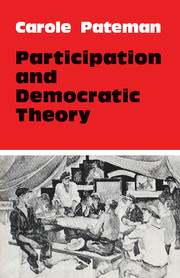Book contents
- Frontmatter
- Contents
- I Recent theories of democracy and the ‘classical myth’
- II Rousseau, John Stuart Mill and G. D. H. Cole: a participatory theory of democracy
- III The sense of political efficacy and participation in the workplace
- IV ‘Participation’ and ‘democracy’ in industry
- V Workers' self-management in Yugoslavia
- VI Conclusions
- Bibliography
- Index
V - Workers' self-management in Yugoslavia
Published online by Cambridge University Press: 05 August 2014
- Frontmatter
- Contents
- I Recent theories of democracy and the ‘classical myth’
- II Rousseau, John Stuart Mill and G. D. H. Cole: a participatory theory of democracy
- III The sense of political efficacy and participation in the workplace
- IV ‘Participation’ and ‘democracy’ in industry
- V Workers' self-management in Yugoslavia
- VI Conclusions
- Bibliography
- Index
Summary
It has been shown that a widespread demand for participation at lower management levels does exist among ordinary workers but this does not seem to be the case where higher level decisions are concerned, as the empirical material cited in the last chapter has illustrated. In the Norwegian survey referred to in Chapter III, Holter found that only 16% of blue collar and 11% of white collar workers wished they had more participation in decisions concerning the management of the whole firm. In the recent study of the Vauxhall car workers a precisely comparable question was not asked, but the workers were asked whether they thought that unions should be solely concerned with pay and conditions or whether they should ‘try and get workers a say in management’. Forty per cent of those questioned thought they should (61% of craftsmen) but the majority attitude can be illustrated by remarks like; ‘the average person in a place like this likes to think he could manage, but management is really for educated people who can do it’. The fact that a majority of the craftsmen wanted this wider role for the unions, and that those in Holter's survey who desired higher level participation were ‘responsible, confident, skilled’ is significant, given the facts about the development of the sense of political efficacy, and it adds further force to the suggestion made in the last chapter that for many of the lower level workers such ideas are simply not ‘available’.
- Type
- Chapter
- Information
- Participation and Democratic Theory , pp. 85 - 102Publisher: Cambridge University PressPrint publication year: 1970
- 1
- Cited by



